Select Language
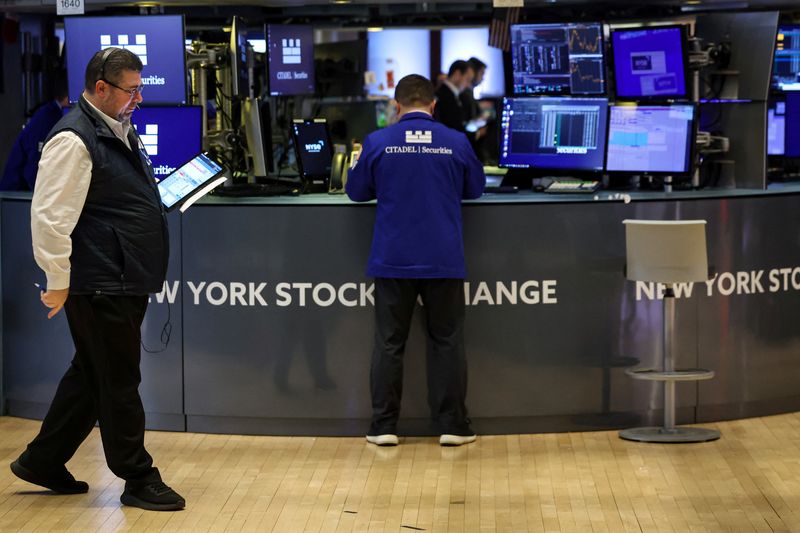
By David French
(Reuters) -The S&P 500 and the Nasdaq Composite posted on Monday their worst quarterly performances since 2022, as uncertainty around the Trump administration’s economic agenda roiled U.S. equity markets in the first quarter of 2025.
The two benchmarks also suffered heavily in March, recording their biggest monthly percentage drops since December 2022, as President Donald Trump rolled out a swathe of new tariffs which raised fears of a global trade war that would hurt economic growth and spur inflation.
For the quarter, the S&P 500 slumped 4.6%, while the Nasdaq Composite plummeted 10.5%. The Dow Jones Industrial Average was not immune to the unease, slipping 1.3% in the opening three months.
"Investors, more or less in this first quarter, threw their hands in the air, as you really cannot trade around this," said Adam Turnquist, chief technical strategist for LPL Financial (NASDAQ:LPLA).
The Magnificent Seven technology names, which drove markets higher over a bull market which stretched through 2023 and 2024, weighed heavily on U.S. equity markets as investors sold off growth names.
Tesla (NASDAQ:TSLA) was down almost 36% in the first quarter, and Nvidia (NASDAQ:NVDA) dropped nearly 20%.
"Our big lesson from the first quarter is diversification is not dead," said Michael Reynolds, vice president of investment strategy at Glenmede.
"Whether you’re looking between, or within, asset classes, if you avoided the perils of market concentration, you actually held up quite a bit better versus some of the headline indexes."
While information technology and consumer discretionary - both sectors with heavy influence from big-tech names - posted double-digit percentage declines for the quarter, a majority of the 11 S&P sectors were higher in the same period, led by energy’s 9.3% increase.
On Monday, both the S&P 500 and the Dow temporarily shook off the uncertainty around the Trump administration’s upcoming tariff plans, which are expected to be outlined in greater detail on Wednesday.
Trump said on Sunday that expected tariffs he is set to announce will include all nations. He has already imposed tariffs on aluminum, steel and autos, along with increased tariffs on goods from China.
The S&P 500 gained 30.91 points, or 0.55%, to 5,611.85 points, and the Dow Jones Industrial Average rose 417.86 points, or 1%, to 42,001.76. The Nasdaq Composite lost 23.70 points, or 0.14%, to 17,299.29. The
Financial stocks helped boost the S&P 500 on Monday. Both Discover Financial Services (NYSE:DFS) and Capital One Financial (NYSE:COF) advanced, up 7.5% and 3.3% respectively, as investors bet their merger would ultimately be approved by regulators.
The S&P 500 consumer staples index, often considered a safe haven within stock markets, was the leading sector though with its 1.6% increase. Energy also rose, tracking a jump in crude prices.
The CBOE Volatility Index, Wall Street’s so-called fear gauge, jumped to a two-week high at 22.28 points.
As a result of tariff uncertainties, Goldman Sachs raised the probability of a U.S. recession to 35% from 20%, cut its year-end target for the S&P 500 to 5,700, and forecast more interest rate cuts by the Federal Reserve.
Focus this week will also be on economic data, including ISM business activity surveys and the crucial non-farm payrolls report. Also due this week are speeches from several U.S. central bank officials, including Fed Chair Jerome Powell.
Drugmakers’ shares slid after reports the U.S. Food and Drug Administration’s top vaccine official had been forced to resign. Moderna (NASDAQ:MRNA) dropped 8.9%.
Gene therapy companies Taysha Gene Therapies and Solid Biosciences (NASDAQ:SLDB) fell 28% and 14.4%, respectively.
In deals news, Rocket Companies was down 7.4% after the mortgage lender said it agreed to a $9.4 billion acquisition of Mr. Cooper Group. The announcement, though, sent the mortgage servicer’s stock up 14.5%.
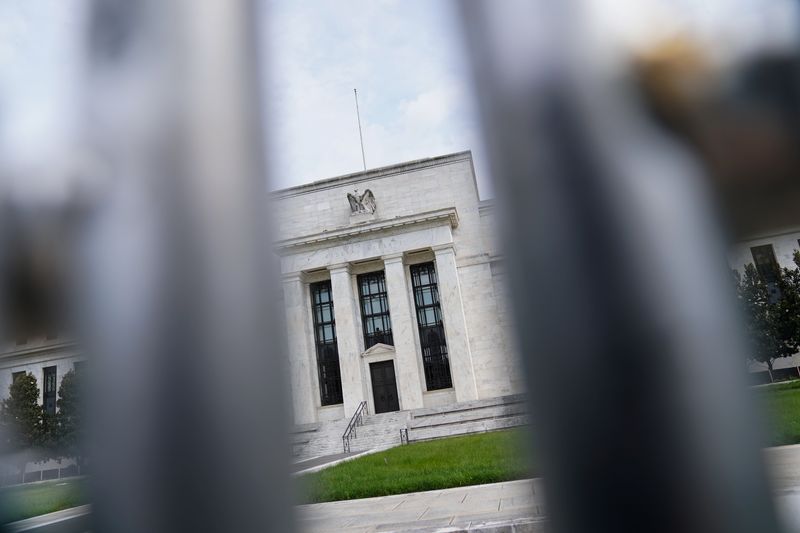
(Reuters) -Goldman Sachs forecast the U.S. Federal Reserve to deliver three quarter point interest rate cuts this year and expects heightened recession risks amid tariff uncertainty, ahead of clarity on President Donald Trump’s reciprocal tariff plan.
The Wall Street brokereage now sees consecutive cuts in July, September, and November, compared to its previous forecast of two cuts in June and December, it said in a note on Sunday.
It anticipates a 15 percentage point increase in tariff rates, a scenario previously considered a "risk-case" but now seems more probable with Trump’s upcoming reciprocal tariff announcement on Wednesday.
The brokerage says the comments from White House officials suggest there is tolerance for short-term economic weakness to achieve their policy goals.
It now sees a 12-month recession probability of 35%, compared to its previous estimate of 20%.
The Fed maintained its benchmark interest rate at 4.25-4.50% in March, with Chair Jerome Powell noting "unusually elevated" uncertainty and challenges in economic projections due to recent policy changes by the Trump administration.
The Personal Consumption Expenditures (PCE) price index, the Fed’s preferred price gauge, increased 0.3% in February after advancing by an unrevised 0.3% in January, data showed on Friday.
Goldman Sachs also lowered its fourth-quarter gross domestic product, or GDP, growth forecast to 1.0% and raised its year-end unemployment rate forecast to 4.5%.
"We continue to believe the risk from April 2 tariffs is greater than many market participants have previously assumed," it added.
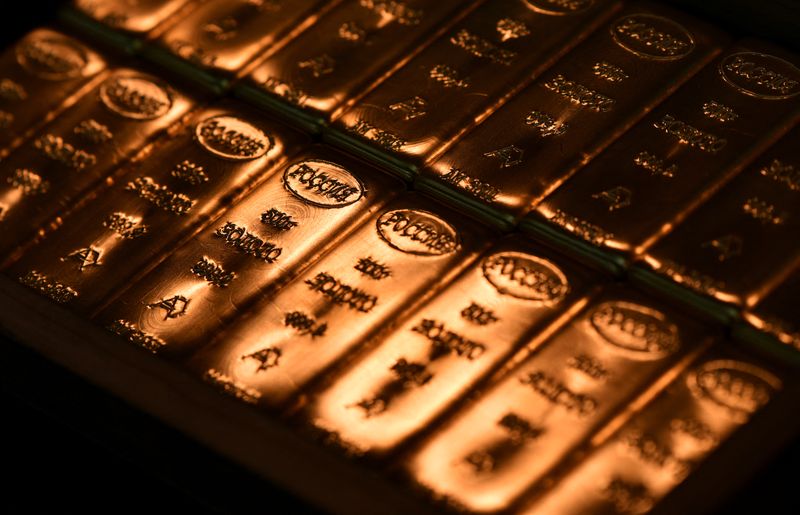
By Anushree Mukherjee
(Reuters) - Gold touched an all-time high on Monday, breaching the $3,100 level, as investors turned to the safe-haven asset amid concerns that U.S. President Donald Trump’s tariff plans would stoke a global trade war and economic fallout.
Spot gold was up 0.6% to $3,103.63 an ounce, as of 0255 GMT, after hitting a record high of $3,107.26 earlier. Bullion is up over 8% in March.
The dollar index eased 0.2%, making dollar-priced gold less expensive for buyers holding other currencies.
"Markets anxiety levels have been ramping up ahead of the reciprocal U.S. tariff announcements, which is keeping gold in high demand as a defensive play," KCM Trade chief market analyst, Tim Waterer said.
"If the tariff announcements this week are not as severe as feared, then the gold price could start to backtrack as profit-taking from the highs may be triggered."
Trump is expected to announce reciprocal tariffs on April 2, while auto tariffs will commence on April 3.
Further widening the global trade war concerns, Trump said on Sunday he was "pissed off" at Russian President Vladimir Putin and will impose secondary tariffs of 25% to 50% on buyers of Russian oil if he feels Moscow is blocking his efforts to end the war in Ukraine.
Gold, traditionally seen as a hedge against political and economic uncertainty, has risen over 18% this year. Bullion’s rally has prompted multiple banks to increase their 2025 gold price forecasts.
Meanwhile, San Francisco Federal Reserve Bank President Mary Daly said inflation data published on Friday confirms her decreased confidence in her baseline expectation that two interest rate cuts this year are a "reasonable" projection.
Spot silver rose 0.4% to $34.23 an ounce, platinum was steady at $983.51 and palladium gained 0.4% to $975.70. All three metals are set for a monthly rise.

By Joe Cash and Ethan Wang
BEIJING (Reuters) -China’s manufacturing activity expanded at the fastest pace in a year in March, a factory survey showed on Monday, with new orders boosting production, giving the world’s No.2 economy some reprieve as it deals with an intensifying U.S. trade war.
The reading should reassure officials that further fiscal support launched this year is bolstering the $18 trillion economy, which is also benefiting from foreign buyers frontloading purchases in anticipation of further U.S. trade curbs.
U.S. President Donald Trump is set to announce new "reciprocal" tariffs on Wednesday to tackle perceived trade imbalances, potentially adding more levies on Chinese goods.
Trump has already imposed a cumulative 20% tariff on all Chinese imports since returning to the White House in January, accusing Beijing of not doing enough to curb the flow of chemicals used to make the deadly drug fentanyl into the U.S.
The official purchasing managers’ index (PMI) rose to 50.5 in March from 50.2 a month prior, the highest reading since March 2024 and matching analysts’ forecasts in a Reuters poll.
The non-manufacturing PMI, which includes services and construction, accelerated to 50.8 from 50.4.
"The official PMIs suggest that infrastructure spending is ramping up again and that exports have so far remained resilient in the face of U.S. tariffs," said Julian Evans-Pritchard, head of China economics at Capital Economics.
"But the surveys are still consistent with slower GDP growth in Q1 amid weakness in the service sector," he added.
China has kept its economic target for this year unchanged at "around 5%" despite Trump’s tariff threats, which could call time on a largely export-led recovery underway since the end of the COVID-19 pandemic in late 2022.
The government has pledged more fiscal stimulus, increased debt issuance, further monetary easing and put even greater emphasis on boosting domestic demand to cushion the impact of the trade war.
China’s economy has had a bumpy start this year, with nascent improvement in retail sales offset by persistent deflationary pressures and rising unemployment.
Trying to assuage concerns among foreign enterprises over China’s economy amid Trump’s tariff threats, Chinese President Xi Jinping gathered a group of multinational CEOs last week and urged them to protect global industry and supply chains.
At a key business forum earlier this month in Beijing, Chinese Premier Li Qiang urged countries to open their markets to combat "rising instability and uncertainty."
Beijing is also doubling down on its "cash for clunkers" consumer goods trade-in programme to encourage households to open up their wallets.
Analysts polled by Reuters forecast the private sector Caixin PMI to have risen to 51.1. The data will be released on April 1.
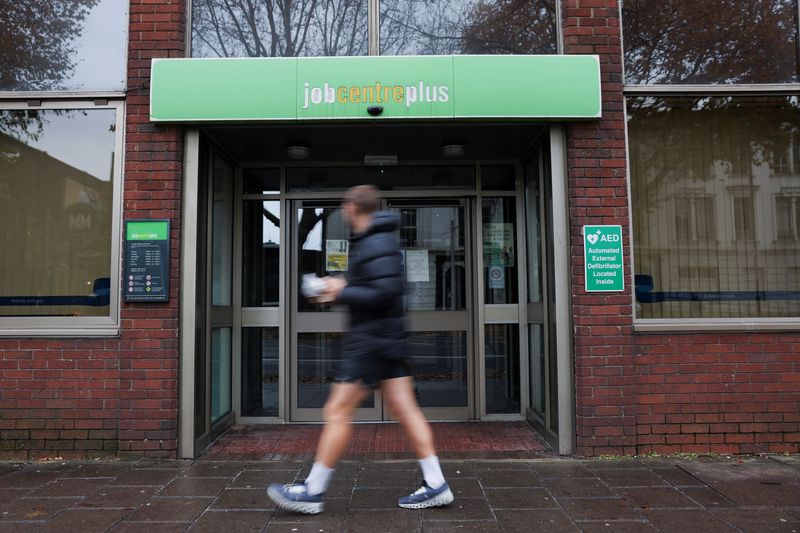
By Ben Ezeamalu
LONDON (Reuters) - UK job vacancies saw the fastest month-on-month growth in three years in February, according to data published on Monday that contrasted with a largely gloomy outlook for the economy.
Job search company Adzuna said the 3.7% increase from January was led by its graduate and healthcare and nursing categories and followed months of slow or no growth in postings.
Vacancies remained down compared with February 2024 but the 0.8% annual drop was the smallest since July 2022.
Andrew Hunter, Adzuna’s co-founder, said February’s monthly increase was surprising given lower-than-expected economic growth and persistent inflation pressures.
Other surveys have painted a weaker picture of the labour market. The Recruitment and Employment Confederation said its figures showed a fall in demand for staff in February.
Last week, the government’s budget watchdog halved its forecast for economic growth in Britain this year to 1%.
Hunter said advertised salaries had outpaced inflation for 10 months in a row and they rose by more than 7% in annual terms in February for a third straight month.
By Ben Ezeamalu
LONDON (Reuters) - UK job vacancies saw the fastest month-on-month growth in three years in February, according to data published on Monday that contrasted with a largely gloomy outlook for the economy.
Job search company Adzuna said the 3.7% increase from January was led by its graduate and healthcare and nursing categories and followed months of slow or no growth in postings.
Vacancies remained down compared with February 2024 but the 0.8% annual drop was the smallest since July 2022.
Andrew Hunter, Adzuna’s co-founder, said February’s monthly increase was surprising given lower-than-expected economic growth and persistent inflation pressures.
Other surveys have painted a weaker picture of the labour market. The Recruitment and Employment Confederation said its figures showed a fall in demand for staff in February.
Last week, the government’s budget watchdog halved its forecast for economic growth in Britain this year to 1%.
Hunter said advertised salaries had outpaced inflation for 10 months in a row and they rose by more than 7% in annual terms in February for a third straight month.
"It’ll be interesting to see if this growth continues in March as we get closer to the introduction of new employer costs," he said.
In her first full budget last October, finance minister Rachel Reeves announced an increase in employers’ social security contributions which is due to start in April alongside a nearly 7% increase in Britain’s minimum wage.
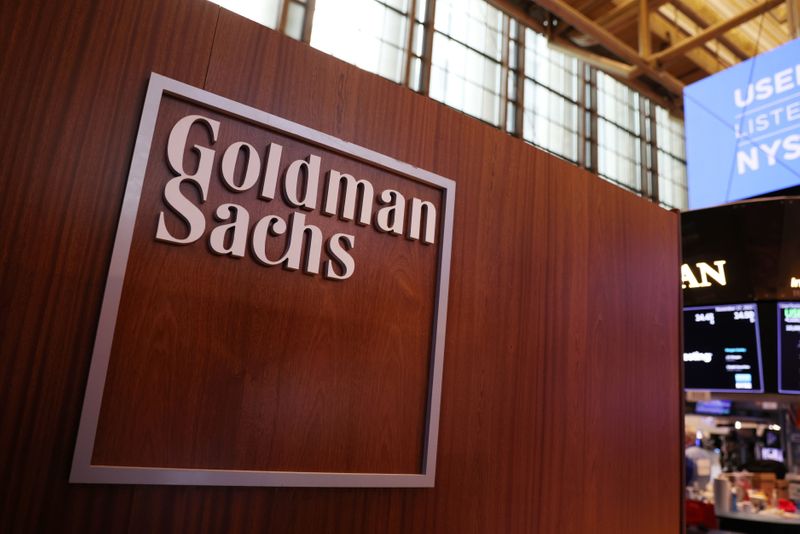
Goldman Sachs said on Sunday that it expects a greater chance of a U.S. recession in the next 12 months, citing uncertainty over trade policy, softening consumer and business confidence and a lower growth baseline.
The investment bank also forecast higher 2025 inflation due to increased trade tariffs, flagging concerns over President Donald Trump’s plans for more aggressive reciprocal tariffs.
Goldman Sachs now sees a 35% chance of a recession in the next 12 months, compared to prior expectations of 20%.
“The upgrade from our previous 20% estimate reflects our lower growth baseline, the sharp recent deterioration in household and business confidence, and statements from the White House officials indicating greater willingness to tolerate near-term economic weakness in pursuit of their policies,” Goldman Sachs analysts wrote in a note.
The investment bank hiked its U.S. tariff assumptions for the second time in a month, forecasting a U.S. tariff rate of 15% in 2025.
Higher tariffs are expected to boost inflation, with Goldman Sachs forecasting core PCE inflation of 3.5% by end-2025, up substantially from current levels and well above the Federal Reserve’s 2% annual target.
The investment bank also forecast 2025 gross domestic product growth of 1% in 2025, down from prior forecasts of 1.5%.
Goldman Sachs’ forecast comes amid growing concerns over a growth slowdown, amid pressure from Trump’s tariff policies and from stickier inflation.
Trump is expected to announce a host of new tariffs on April 2, a date he has constantly touted as liberation day. Trump is expected to outline reciprocal tariffs against major U.S. trading partners, with recent reports showing that he could impose as much as 20% tariffs across the board.

DUBLIN (Reuters) - Irish consumer sentiment dropped to its lowest level in nine months in March as the prospect of U.S. tariffs on the European Union made consumers more nervous about the outlook for the economy and their own finances, a survey showed on Friday.
The Credit Union Consumer Sentiment index fell to 67.5 from 74.8 in February, the largest monthly pullback in two-and-a-half years and well below its long-term average of 84.2.
Research co-authored by the Irish finance ministry this week found that Ireland faces a disproportionate hit from tit-for-tariffs.
Irish League of Credit Unions CEO David Malone said it was not surprising that the sentiment survey painted a picture of a much more nervous Irish consumer.
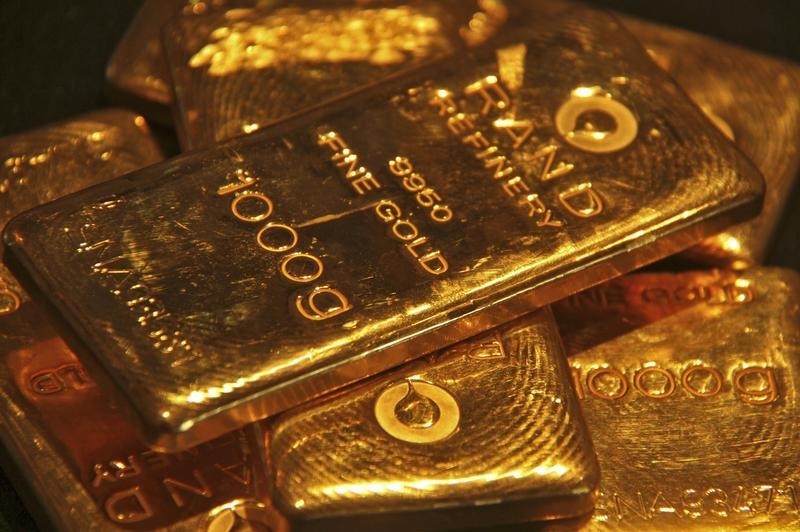
Gold prices hit a record high in Asian trade on Friday, extending recent gains amid heightened safe haven demand after U.S. President Donald Trump imposed steep tariffs on the automobile sector.
Investors were also bracing for a potentially hotter PCE price index reading later in the day. The print is the Federal Reserve’s preferred inflation gauge, and is expected to factor into expectations for future interest rate cuts.
Gold was sitting on bumper gains through March, having benefited from deteriorating risk appetite as markets fretted over Trump’s tariffs and the threat of a U.S. recession. Geopolitical tensions between Russia and Ukraine, as well as a breakdown in the Israel-Hamas ceasefire fueled haven demand.
Spot gold traded up 0.6% at $3,073.79 an ounce by 00:47 ET (04:47 GMT), after hitting a record high of $3,077.67/oz earlier in the day. Gold futures expiring in May jumped 0.7% to $3,112.72/oz after hitting a peak of $3,117.50/oz.
Tariff jitters persist, keep gold uplifted
Trump’s auto tariffs were a main point of support for gold in the past two sessions, with the U.S. President stating that his 25% duties will take effect from April 2.
Trump is set to announce reciprocal tariffs against a host of major U.S. trading partners on the date, with the scope and potential impact of his tariffs being a key point of uncertainty for markets.
Trump has also threatened tariffs against industries such as semiconductors and pharmaceuticals, as well as select commodities.
The U.S. President’s tariff agenda has drawn ire from other countries, with Canada, China, Europe and Mexico all preparing retaliatory measures, marking the start of a global trade war.
This uncertainty factored heavily into demand for gold.
Other precious metals also rose on Friday. Platinum futures inched up to $989.55/oz, while silver futures were an outlier, rising 0.6% to an over 12-year high of $35.283/oz.
Among industrial metals, benchmark copper futures on the London Metal Exchange fell 0.3% to $9,828.80 a ton, while U.S. copper futures fell 0.4% to $5.1015 a pound, retreating from record highs hit earlier this week. U.S. copper prices rallied on expectations that Trump’s tariffs on the red metal will severely crimp copper supplies in the country.
PCE inflation awaited for more rate cues
Markets were now awaiting key PCE price index data for February, which is the Federal Reserve’s preferred inflation gauge, for more cues on the U.S. economy and interest rates.
While consumer and producer inflation readings for the month showed some cooling, components from the two, which factor into PCE inflation, rose through the month. This kept investors largely on edge over a potentially hotter than expected PCE print.
Core PCE inflation is also expected to have risen further above the Fed’s 2% annual target.
Sticky inflation gives the Fed less impetus to cut interest rates, with the central bank having signaled as much during a meeting earlier this month.

By Hyunjoo Jin and Kantaro Komiya
SEOUL/TOKYO (Reuters) -For Japan and South Korea, tariffs announced by U.S. President Donald Trump represent a blow to domestic car industries that are both economic pillars and sources of national pride.
Shares in companies such as Japan’s Toyota and Honda (NYSE:HMC) and South Korea’s Hyundai Motor (OTC:HYMTF) and Kia Corp fell, wiping off some $16.5 billion in value, after Trump on Wednesday unveiled a 25% tariff on imported cars and light trucks to take effect on April 3.
On the streets of Tokyo and Seoul, and in "motor city" Gwangju, people were concerned the levies would have a far-reaching impact, speaking to the singular role the car industry has played in the post-war economic rise of the two U.S. allies.
While car production helped transform Germany, Italy and France after World War Two, its influence in Asia has been even more profound. Automakers form the nucleus of vast networks of group companies that impact almost every facet of working life in the two countries.
In Japan, where the industry accounts for roughly 3% of gross domestic product, it is the automakers - particularly Toyota (NYSE:TM) - that set the precedent for national wage increases through annual talks between unions and management.
The auto supply chain totalled around 60,000 companies as of May last year, according to research firm Teikoku Databank. The industry is broadly responsible for the employment of more than 5 million people, or 8% of the entire workforce, according to the Japan Automobile Manufacturers Association.
South Korea’s car industry is its biggest employer, and cars and automotive parts account for 14% of exports. About half go to the United States.
"The auto industry is the first thing that comes to mind for most people when you mention manufacturing," said Hiroshi Kojima, a 56-year-old businessman at a materials company who spoke to Reuters in central Tokyo.
"I am worried this could have a big impact on the economy and hit production of Japan’s manufacturers."
UNCERTAINTY IN MOTOR CITY
In Gwangju, South Korea, home to the factories that export Kia’s Sportage, Soul and Seltos crossovers to the United States, "we are concerned about production volume and jobs," said a worker at a Kia supplier, who spoke on condition of anonymity.
He told Reuters his factory planned to keep staffing Saturday shifts in April, but that demand looked uncertain.
U.S. automaker General Motors (NYSE:GM) has factories in South Korea that export more than 80% of vehicles produced, including Chevrolet Trax and Trailblazer crossovers to the United States. They are likely to be hit harder than plants of South Korean rivals, which produce more cars for the domestic market.
"We are nervous," one union worker told Reuters, also speaking on condition of anonymity. He said management previously told the union that 2025 production would be in line with last year, and has not so far updated its targets.
"We are very concerned about the absence of the South Korean president who can address tariff issues. This is not something that we can control," the worker said, referring to the political turmoil that started in December when now-impeached President Yoon Suk Yeol briefly declared martial law.
South Korea’s industry minister Ahn Duk-geun met with executives from automakers and suppliers on Thursday and expressed concern about the impact of tariffs, especially for auto parts makers. He promised measures by April to minimise the impact, including boosting domestic investments and demand.
Japanese Prime Minister Shigeru Ishiba said Tokyo would put "all options on the table" and noted that Japan is the top source of foreign investment into the United States, something the government has been stressing to Washington.
In 2023 Japan exported 4.4 million vehicles, including trucks and buses, with one-third going to the United States.
The tariffs hit a key part of most global automakers’ supply chains - Mexico, where for years they have built up lower-cost production bases.
Mexico is the top vehicle exporter to the United States, accounting for 2.5 million light vehicles in 2023, according to the Mexican Automotive Industry Association. Nissan (OTC:NSANY) took a 10% share of that, the largest among Asian carmakers but less than General Motors, Stellantis (NYSE:STLA) and Ford.
JOB WORRIES
For 57-year-old waitress Etsuko Fukada, the tariffs highlighted the difficult dynamics of Japan’s relationship with the United States. She said Tokyo was unlikely to speak out because of its reliance on Washington for its military defence.
The auto industry has become even more important as Japan’s influence in other areas - such as consumer electronics and microchips - has waned in recent years. Automakers are still seen as top destinations for new graduates and competition for white-collar jobs can be fierce.
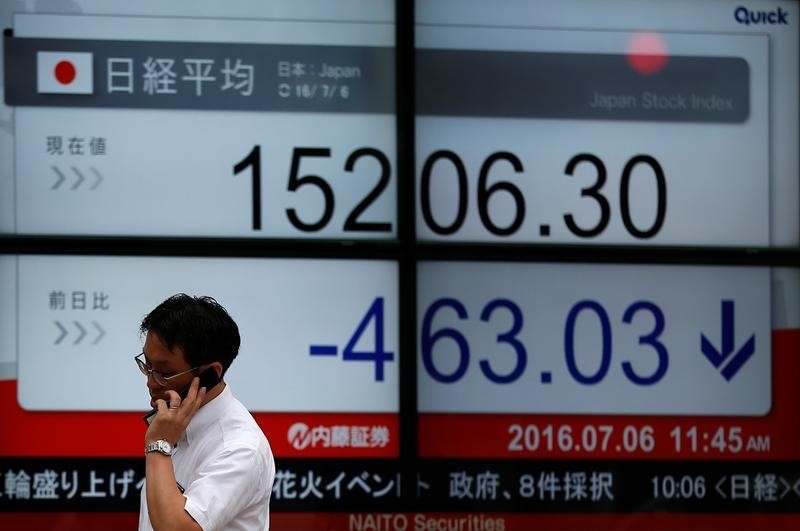
Most Asian stocks fell on Friday, extending recent losses as investors remained on edge over U.S. President Donald Trump’s tariff agenda.
Japanese markets were by far the worst performers in the region, especially as hotter-than-expected inflation data from Tokyo ramped up bets on an early rate hike by the Bank of Japan.
Automobile and technology sectors clocked the biggest losses, with auto stocks still reeling from Trump’s announcement of 25% tariffs on the sector. Tech was dented by persistent losses in chipmakers, amid growing concerns of oversupply in the artificial intelligence data center industry.
Regional markets took a weak lead-in from Wall Street, which fell for a second straight session on concerns over Trump’s tariffs. The U.S. The President is set to impose even more duties on April 2.
U.S. stock index futures were muted in Asian trade, with focus turning to upcoming PCE price index data for more cues on U.S. inflation.
Japanese stocks slide on hot CPI
Japan’s Nikkei 225 and TOPIX indexes were the worst performers in Asia on Friday, losing more than 2% each.
Losses in the two were driven chiefly by concerns over higher interest rates in the country, after Tokyo consumer price index inflation data read higher than expected for March, remaining above the BOJ’s 2% annual target.
This saw analysts begin factoring in a greater chance that the BOJ could raise rates by as soon as May, as it moves to curb inflationary pressures and wean the economy off monetary support.
Asia stocks dip on auto, tech losses
Japanese stocks were also wallopped by persistent weakness in heavyweight auto stocks such as Toyota (NYSE:TM) Motor Corp (H:7203) and Honda Motor Co Ltd (TYO:7267). The country’s two biggest automakers slid nearly 5% each, extending steep losses from the prior session following Trump’s tariff announcement.
Losses in major tech stocks also weighed.
South Korea’s KOSPI slid 1.7% on a similar trend, given that tech and chip stocks are among the heaviest on the index. Hyundai (OTC:HYMTF) Motor (KS:005380)- the world’s third-largest automaker by sales- slid 4.2%, while memory chip giant SK Hynix fell 3.5%.
In Taiwan, TSMC (TW:2330)- the world’s biggest chipmaker- fell 0.9%, while electronics assembly giant Hon Hai Precision Industry Co Ltd (TW:2317) slid 3.4%.
Tech stocks were slammed by growing questions over a supply glut in the AI data center industry- a key source of chip demand- after major investor Microsoft Corporation (NASDAQ:MSFT) was seen cancelling several data center leases.
Broader Asian markets were less negative, with China’s Shanghai Shenzhen CSI 300 and Shanghai Composite indexes losing about 0.2% and 0.4%, respectively. Hong Kong’s Hang Seng index fell 0.3%, but was on track to recoup all of its losses from earlier in the week.
Chinese stocks have vastly outpaced their peers so far in 2025 amid growing optimism over the country’s AI capabilities, as well as more stimulus from Beijing. Focus is now on purchasing managers index data for March, due on Monday, for more cues.
Australia’s ASX 200 rose 0.2% before a Reserve Bank of Australia meeting next week, where the central bank is widely expected to keep rates unchanged.
Singapore’s Straits Times index rose 0.1% after hitting a series of record highs this week, while futures for India’s Nifty 50 index pointed to a flat open.

